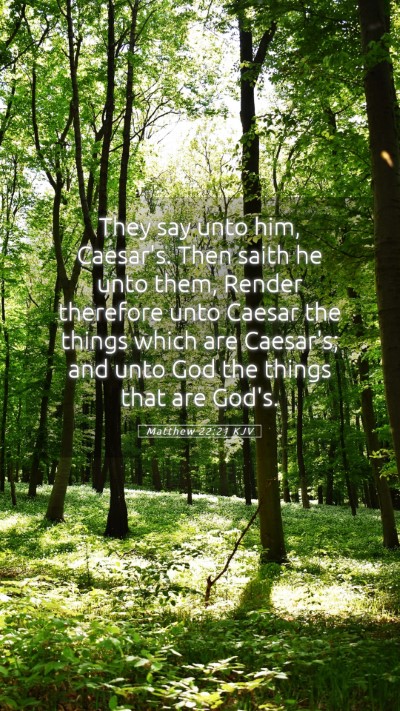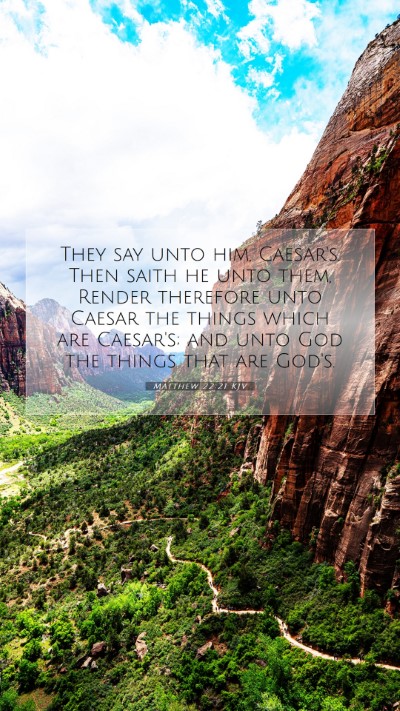Understanding Matthew 22:21: A Comprehensive Bible Verse Commentary
Matthew 22:21 states, "Render therefore unto Caesar the things which are Caesar's; and unto God the things that are God's." This verse is profound and rich in meaning, reflecting the intersection of civil and divine responsibilities. The following commentary includes insights from renowned Biblical scholars Matthew Henry, Albert Barnes, and Adam Clarke.
Verse Context
This verse occurs in a critical moment during Jesus' ministry, where He is confronted by the Pharisees and Herodians, who seek to trap Him with a question about paying taxes to Caesar. The historical and political context of the time illustrates a society grappling with Roman occupation, where issues of loyalty and righteousness are central to the Jewish populace.
Exegesis of Matthew 22:21
1. Interpretation of "Render Therefore Unto Caesar"
Both Matthew Henry and Albert Barnes emphasize the importance of fulfilling civil obligations. Henry suggests that Jesus advocates for lawful obedience to governmental authorities, acknowledging that civil governance is part of God's divine order.
- Civil Authority Acknowledged: The phrase implies an acceptance of governmental structures and the responsibilities they entail.
- Obligations of Citizenship: It highlights that one must respect and fulfill duties as a citizen, such as paying taxes, which are seen as lawful and necessary in a society.
2. Interpretation of "And Unto God the Things That Are God's"
Adam Clarke points out the duality presented in this statement. While civil duties are recognized, the greater emphasis is placed on our responsibilities toward God. This highlights the need for believers to prioritize spiritual obligations over earthly ones.
- Divine Authority Recognized: The reference to God emphasizes the sovereignty of the divine over human governance.
- Spiritual Duties: It instructs individuals to engage in acts of worship, obedience, and service toward God more than simply being compliant citizens.
Theological Implications
This verse invites a theological analysis of the relationship between secular and sacred authority. Matthew Henry notes that while earthly authorities have their place, they are ultimately accountable to God. The dual focus of this teaching supports the concept of a balanced life wherein people navigate both their roles as citizens and as believers.
1. Balance Between Earthly and Divine Authority
It raises crucial questions about the extent of a Christian’s involvement in worldly affairs. Barnes suggests that while Jesus acknowledges the legitimacy of civil government, He simultaneously asserts that believers must remain focused on their heavenly citizenship and responsibilities.
2. Application of the Verse in Daily Life
Practically, this exhortation has profound implications for how believers engage with society. Christians are called to reflect Christ in their interactions with governmental systems while maintaining a devotion to divine principles and commands.
Applications for Bible Study Groups
For those participating in bible study groups or engaging in online bible study, Matthew 22:21 serves as an excellent discussion starter. Key applications include:
- Exploring the nature of authority in our lives.
- Debating the implications of this verse on contemporary issues like taxation and civic duty.
- Reflecting on how believers can balance their allegiance to God with their responsibilities as citizens of a country.
Cross References
This verse can be cross-referenced with several passages that further express the theme of authority and responsibility:
- Romans 13:1-7: A detailed discourse on submission to governing authorities.
- 1 Peter 2:13-17: Encouragement to honor the emperor while fearing God.
- John 18:36: Jesus speaks of His kingdom not being of this world, maintaining a distinction between earthly and divine rule.
Conclusion
Matthew 22:21 is rich in its implications regarding the coexistence of civil and divine authority. Its teachings prompt believers to navigate their responsibilities thoughtfully, acknowledging the space both authorities occupy in their lives. Through careful Bible study insights and scripture analysis, this verse can enhance one's understanding of both worldly and spiritual engagements.


